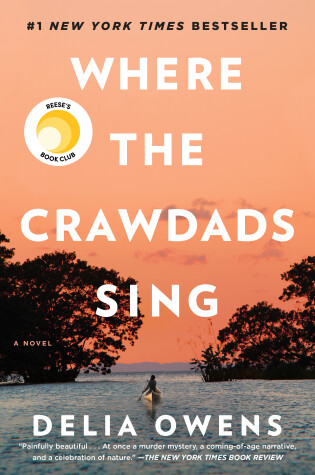Reviewed by clq on
The story, in short, is about a girl who grows up and comes of age in North Carolina in the 50s. Her family leaves her, and she has to make it alone. She goes through life avoiding interactions with other people whenever possible, a mission she mostly succeeds at. However, her quiet life in the marshes of North Carolina is eventually disturbed by… well, some more or less inconvenient romantic feelings upon which the plot of this book hinges.
I’ll start with what I really didn’t like about the book, as I might as well get that part out of the way. By my reading the romance-parts of the book romanticises the idea of a woman not being able to live a full life without a man being part of it. I’m not saying this is the correct reading, but that’s the tone I felt the book struck. I could have accepted this as a genre-device that just didn’t happen to be my cup of tea, but it became really problematic for me when actions that were obviously bad or malicious in the eyes of the reader were presented in a way which was shrouded in romance, not just for the characters in the book, but also from the readers point of view. I get that characters in the books may, indeed, probably have to, have mixed feelings about what plays out. However, when the reader knows that one character is obviously acting reprehensibly toward another character, the fact that the reprehensible action is presented as romantic, for no apparent reason other than to make some extra hay out of pressing additional emotional buttons, feels seriously misjudged to me. That’s about as far into my problems as I can go without giving anything away, but at a point where I’d already become very annoyed at the book, the following sentence popped up and almost made me lose all faith in whether the book could redeem itself at all:
“He leaned down and kissed her softly at first, and then like a man.”
Whether or not someone would find that sentence problematic is a matter of personal opinion. I guess some might even find it romantic. Personally I find the sentiment that the sentence invokes to be problematic, and I guess a reaction to that sentence might, in and of itself, be a reasonable litmus test as to whether someone would appreciate the romance in this book or not. Anyway, at best this book is using well-known, accepted, tropes which just aren’t familiar to me, and of which I’m not a fan. At worst this book is taking advantage of being set in the past in order to present outdated gender-roles, and the lack of respect for and agency in women, as something that is romantic. I’m sure the truth is somewhere between the two, probably tending toward the former.
Okay, now that I got that out of my system – this book also has some good parts. In fact, it has some very good parts. I really enjoyed the growing-up-and-coming-of-age story in this book a lot. Despite the character being, in theory, about as unrelatable to me as any character could be, I found myself feeling along with her. The telling of the story takes it’s time where it needs to, focusing on things that don’t necessarily drive the story along, but fills in the picture of both the environment the story takes place in, and also a the protagonists state of mind.
And just that, the state of mind of the protagonist, and the way in which it is used as a device, is probably my favourite thing about the book. The reader essentially lives inside of her head, reading her thoughts, yet she is still distant, and it’s impossible to get a hold on what she is feeling and why. This feels like the kind of distance that everyone around her must also feel, a “never quite sure”-ness that the plot of the book comes to rely on. It works brilliantly, and is really well done.
At the start of the book the reader is also made aware of a murder that has been committed, the details and relation to the rest of the story of which is gradually revealed as it progresses. This is done through time-jumps, a device which is also used well. The relatively short legal-drama part of the book was perfectly satisfying, in so much that it held my interest and had me questioning what would happen, but ultimately the crime-branch of this story is a device used to tell the story of the main character – and it never feels like more than that.
Overall I’d say this is probably a fantastic book for the people who like it, it’s really well done, and a satisfying read. I’ll give it some credit for ultimately getting me on board, despite the fact that I’m probably well outside of it’s target audience. As far as star-ratings go, I haven’t been this undecided since The Secret Agent. At one point I was thinking that this was a 2/5, immediately after I finished it I was thinking 3/5, but having digested it a bit I acknowledge that the aspects of this book that bother me are a relatively small part of the whole – and that the other parts of the whole gave me enough enjoyment that I probably shouldn’t let some intense annoyance overshadow it completely. I’ve ended up on a 3.5/5, tending toward 4. I found parts of this book to be unjustifiably problematic, but ultimately it’s a well-told, solid story. Despite my anger at it, this book gave me more enjoyment than I would have thought any historical-fiction-romance book would have been able to give me.
Reading updates
- Started reading
- 23 January, 2020: Finished reading
- 23 January, 2020: Reviewed
